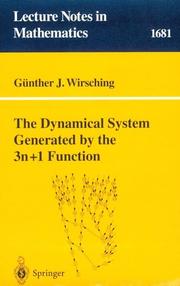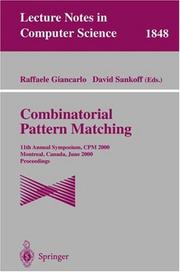| Listing 1 - 5 of 5 |
Sort by
|
Book
ISBN: 0122409604 9780122409608 Year: 1974 Volume: 17 Publisher: New York Academic Press
Abstract | Keywords | Export | Availability | Bookmark
 Loading...
Loading...Choose an application
- Reference Manager
- EndNote
- RefWorks (Direct export to RefWorks)
Stochastic processes --- Discrete mathematics --- Combinatorial probabilities --- Probabilités combinatoires --- 519.212 --- Probabilistic combinatorics --- Probabilities --- Abstract probability theory. Combinatorial probabilities. Geometric probabilities --- Combinatorial probabilities. --- 519.212 Abstract probability theory. Combinatorial probabilities. Geometric probabilities --- Probabilités combinatoires
Book
ISBN: 1447148142 1447148134 Year: 2013 Publisher: London : Springer London : Imprint: Springer,
Abstract | Keywords | Export | Availability | Bookmark
 Loading...
Loading...Choose an application
- Reference Manager
- EndNote
- RefWorks (Direct export to RefWorks)
Probabilistic Group Theory, Combinatorics, and Computing is based on lecture courses held at the Fifth de Brún Workshop in Galway, Ireland in April 2011. Each course discusses computational and algorithmic aspects that have recently emerged at the interface of group theory and combinatorics, with a strong focus on probabilistic methods and results. The courses served as a forum for devising new strategic approaches and for discussing the main open problems to be solved in the further development of each area. The book represents a valuable resource for advanced lecture courses. Researchers at all levels are introduced to the main methods and the state-of-the-art, leading up to the very latest developments. One primary aim of the book’s approach and design is to enable postgraduate students to make immediate use of the material presented.
Group theory --- Combinatorial group theory --- Combinatorial probabilities --- Computer science --- Mathematics --- Physical Sciences & Mathematics --- Algebra --- Mathematical Theory --- Probabilistic combinatorics --- Combinatorial groups --- Groups, Combinatorial --- Mathematics. --- Group theory. --- Group Theory and Generalizations. --- Symbolic and Algebraic Manipulation. --- Probabilities --- Combinatorial analysis --- Data processing. --- Groups, Theory of --- Substitutions (Mathematics) --- Computer science—Mathematics.
Book
ISBN: 0470993944 Year: 1978 Publisher: Washington (D.C.): Winston
Abstract | Keywords | Export | Availability | Bookmark
 Loading...
Loading...Choose an application
- Reference Manager
- EndNote
- RefWorks (Direct export to RefWorks)
Probability theory --- Combinatorial probabilities --- Distribution (Probability theory) --- Stochastic processes --- 519.2 --- Random processes --- Probabilities --- Distribution functions --- Frequency distribution --- Characteristic functions --- Probabilistic combinatorics --- Probability. Mathematical statistics --- 519.2 Probability. Mathematical statistics --- Probabilités combinatoires --- Probabilités --- Loi des grands nombres --- Law of large numbers --- Théorème de la limite centrale --- Central limit theorem --- Probabilités combinatoires. --- Probabilités. --- Théorème de la limite centrale. --- Central limit theorem. --- Combinatorial probabilities. --- Law of large numbers. --- Probabilities. --- Probabilités combinatoires --- Probabilités --- Théorème de la limite centrale --- Epreuve d'hypothese

ISBN: 3540639705 3540696776 9783540639701 Year: 1998 Volume: 1681. Publisher: Berlin Springer
Abstract | Keywords | Export | Availability | Bookmark
 Loading...
Loading...Choose an application
- Reference Manager
- EndNote
- RefWorks (Direct export to RefWorks)
The 3n+1 function T is defined by T(n)=n/2 for n even, and T(n)=(3n+1)/2 for n odd. The famous 3n+1 conjecture, which remains open, states that, for any starting number n>0, iterated application of T to n eventually produces 1. After a survey of theorems concerning the 3n+1 problem, the main focus of the book are 3n+1 predecessor sets. These are analyzed using, e.g., elementary number theory, combinatorics, asymptotic analysis, and abstract measure theory. The book is written for any mathematician interested in the 3n+1 problem, and in the wealth of mathematical ideas employed to attack it.
Differential geometry. Global analysis --- Combinatorial probabilities --- Convergence --- Convergentie --- Mathematical sequences --- Numerical sequences --- Numerieke reeksen --- Reeksen (Wiskunde) --- Sequences (Mathematics) --- Suites (Mathématiques) --- Suites numériques --- Wiskundige reeksen --- Combinatorial probabilities. --- Convergence. --- Probabilités combinatoires --- Convergence (Mathématiques) --- Mathematical Theory --- Applied Mathematics --- Mathematics --- Engineering & Applied Sciences --- Physical Sciences & Mathematics --- Suites (Mathématiques) --- Probabilités combinatoires --- Convergence (Mathématiques) --- Suites récurrentes (mathématiques) --- Recurrent sequences (Mathematics) --- Number theory. --- Computers. --- Number Theory. --- Theory of Computation. --- Automatic computers --- Automatic data processors --- Computer hardware --- Computing machines (Computers) --- Electronic brains --- Electronic calculating-machines --- Electronic computers --- Hardware, Computer --- Computer systems --- Cybernetics --- Machine theory --- Calculators --- Cyberspace --- Number study --- Numbers, Theory of --- Algebra --- Probabilistic combinatorics --- Probabilities --- Suites récurrentes (mathématiques) --- Nombres, Théorie des --- Systèmes dynamiques --- Theorie des nombres --- Theorie probabiliste

ISBN: 3540451234 3540676333 Year: 2000 Publisher: Berlin, Heidelberg : Springer Berlin Heidelberg : Imprint: Springer,
Abstract | Keywords | Export | Availability | Bookmark
 Loading...
Loading...Choose an application
- Reference Manager
- EndNote
- RefWorks (Direct export to RefWorks)
Computer science. --- Computers. --- Algorithms. --- Information storage and retrieval. --- Text processing (Computer science). --- Pattern recognition. --- Combinatorics. --- Computer Science. --- Pattern Recognition. --- Theory of Computation. --- Algorithm Analysis and Problem Complexity. --- Document Preparation and Text Processing. --- Information Storage and Retrieval. --- Combinatorial probabilities. --- Probabilistic combinatorics --- Probabilities --- Optical pattern recognition. --- Information theory. --- Computer software. --- Natural language processing (Computer science). --- Information storage and retrieva. --- Natural Language Processing (NLP). --- Combinatorics --- Algebra --- Mathematical analysis --- NLP (Computer science) --- Artificial intelligence --- Electronic data processing --- Human-computer interaction --- Semantic computing --- Software, Computer --- Computer systems --- Communication theory --- Communication --- Cybernetics --- Optical data processing --- Pattern perception --- Perceptrons --- Visual discrimination --- Information storage and retrieval systems. --- Automatic data storage --- Automatic information retrieval --- Automation in documentation --- Computer-based information systems --- Data processing systems --- Data storage and retrieval systems --- Discovery systems, Information --- Information discovery systems --- Information processing systems --- Information retrieval systems --- Machine data storage and retrieval --- Mechanized information storage and retrieval systems --- Electronic information resources --- Data libraries --- Digital libraries --- Information organization --- Information retrieval --- Design perception --- Pattern recognition --- Form perception --- Perception --- Figure-ground perception --- Algorism --- Arithmetic --- Automatic computers --- Automatic data processors --- Computer hardware --- Computing machines (Computers) --- Electronic brains --- Electronic calculating-machines --- Electronic computers --- Hardware, Computer --- Machine theory --- Calculators --- Cyberspace --- Foundations
| Listing 1 - 5 of 5 |
Sort by
|

 Search
Search Feedback
Feedback About UniCat
About UniCat  Help
Help News
News